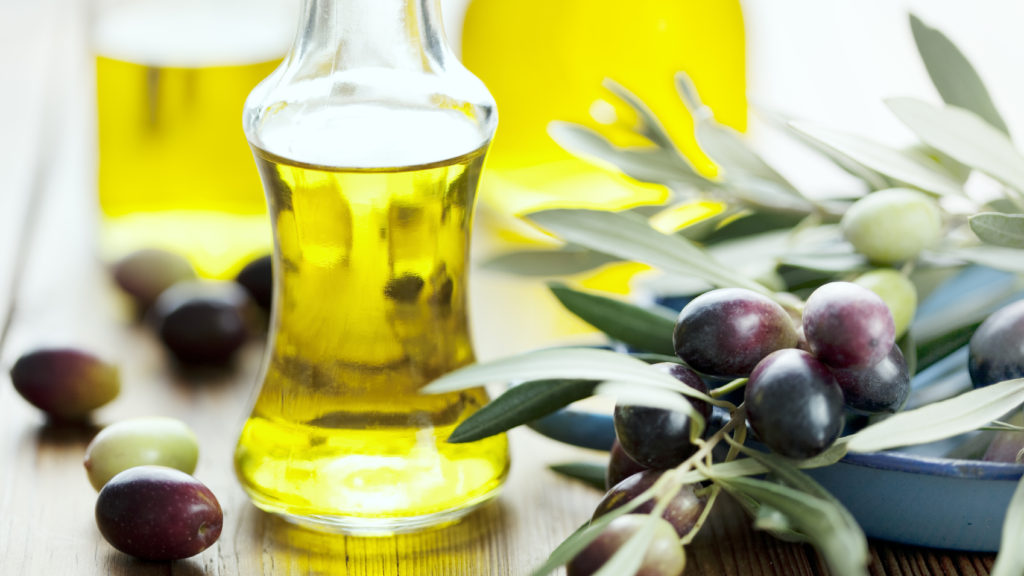Does eating fat make you fat? Not necessarily. Some fats are good for you. Instead of making you fat, these so-called “friendly fats” actually help you maintain a healthy weight.
One of the friendliest fats is extra virgin olive oil. People on the Greek island of Crete eat a diet which is 40% fat, mainly from olive oil. They have far less obesity than Americans, and lower rates of heart disease than even the Japanese.
A partial list of the health benefits of olive oil include lowering “bad” LDL cholesterol while raising “good” HDL cholesterol, preventing several varieties of cancer, modulating immune response and reducing inflammation. No wonder Hippocrates, the father of medicine, called olive oil the “great therapeutic.”
Olive oil has been the cornerstone of the Mediterranean diet for thousands of years. The first olive trees were domesticated over 5,000 years ago, and olive oil probably began being pressed not long after. The world”s oldest cookbook contains a 2000-year-old recipe for mixing roots, leaves and salt into Spanish olive oil to fake the higher quality Liburnian oil.
Apparently, misrepresenting olive oil to make the consumer think it is of a higher quality has a long tradition. Shopping for olive oil can be confusing because it comes in different grades: “extra virgin”, “virgin”, and “pure”.
If you want to use olive oil for its health benefits, stick to “extra virgin” or “virgin.” These oils are naturally produced through a cold pressing process using ripe olives. In contrast, non-virgin olive oils are almost always extracted from olive pulp with chemical solvents and should be avoided.
This includes so-called “Light” and “Extra Light” olive oils, which represent a triumph of marketing over good nutrition. The “light” they are referring to is the color, not the caloric content. These oils are derived from the lowest quality olive oils through chemical processing. Their only virtue is that they can withstand high temperature cooking, but they are of limited nutritional value and are only edible because they are so refined.
Of course, even if an olive oil is labeled “extra virgin”, it isn’t necessarily a guarantee of quality. As one wag has said: “cheap extra-virgin Italian olive oil probably isn’t.”
So how do you tell if the olive oil you are buying is any good? The best way to evaluate olive oil is taste and smell. Good olive oil will smell rich and fruity. It will be slightly bitter in the middle of your mouth and have a faint ”peppery” bite. It should not have a strong aftertaste. If the oil doesn”t taste good to you, it is better not to use it.
Marcella Hazan in her cookbook Marcella Cucina notes: “The taste of a dish for which you need olive oil will be as good or as ordinary as the oil you use. A sublime one can lift even modest ingredients to eminent heights of flavor; a dreary oil will pull the best ingredients down to its own level.”
Olive oil is wonderfully versatile. You can use it in salad dressings, vinaigrettes and sauces. It is delicious on a baked potato or mixed with mashed potatoes. Extra virgin olive oil tastes great on cooked vegetables or brushed onto fish or meat before serving. I especially like to use it for roasting vegetables.
While extra virgin olive oil works fine for sautéing vegetables at lower temperatures, it has a low smoke point, so isn’t recommended for frying or deep frying. For these uses I prefer grapeseed oil, which has a high smoke point and more neutral flavor.
Here is a recipe for oven roasted root vegetables. This colorful dish pairs well with chicken. You can vary the ingredients based on what is available. Try using parsnips and turnips instead of carrots and potatoes, rosemary instead of thyme, shallots or onions instead of garlic.
Oven Roasted Root Vegetables
Preheat oven to 400 degrees F.
8 small young carrots, trimmed, or 1lb. large carrots cut into pieces
8 fingerling potatoes, or 1lb. large potatoes cut into pieces
8 baby beets, or 1lb. larger beets cut into pieces
3 sprigs fresh thyme
3 cloves garlic, smashed and peeled
3 tablespoons extra-virgin olive oil
Kosher salt and freshly ground black pepperToss the carrots, potatoes, beets, thyme sprigs and garlic in a roasting pan with the olive oil. Season generously with salt and pepper. Roast, stirring occasionally, until tender, about 30 minutes. Keep the vegetables in the turned-off oven until ready to serve.


